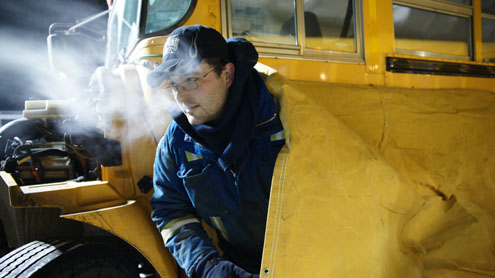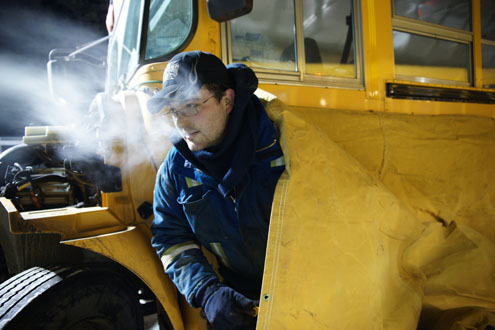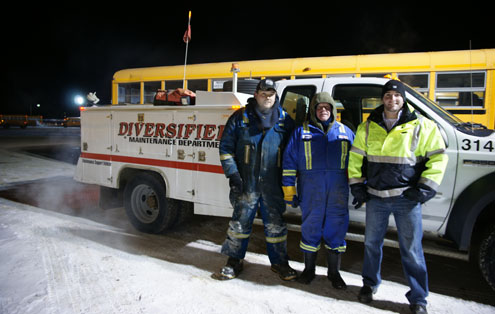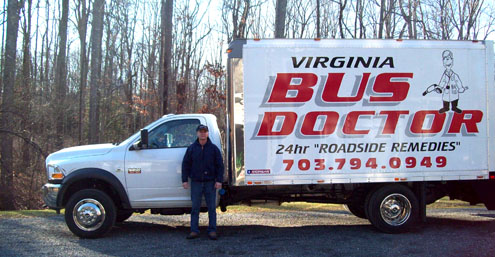
 Mobile mechanics are the Lone Rangers of the bus industry
Mobile mechanics are the Lone Rangers of the bus industry
By Glenn Swain
The next time you see a bus or motorcoach broken down on the side of the road, you can bet a mobile repair crew is already on the way to save the day. Road calls are a distress message for a mechanic; an SOS turns into a SOB: Save Our Bus.
Mobile repair mechanics bring tools, spare parts and vast knowledge of the inner workings of a bus and motorcoach to get the wheels rolling again. Fighting against harsh weather conditions, difficult repairs and long, unconventional hours, mobile mechanics are seen as the Lone Rangers of the bus industry.
Alberta’s ice road mechanics
Every day thousands of vehicles ranging from light vehicles to heavy-hauler trucks travel along Alberta, Canada’s remote, two-lane Highway 63, which has the unfortunate distinction of being the province’s deadliest roadway. Joining this bumper-to-bumper convoy are hundreds of motorcoaches operated by Fort McMurray-based Diversified Transportation. The company’s 377 Prevost and MCI coaches roll 18 hours a day delivering oil workers to the Oil Sands region between Fort McMurray and Fort MacKay, and to other remote sites. For years multi-billion-dollar oil sands projects have attracted workers, making Fort McMurray one of Canada’s fastest growing cities. All of those workers need to get to work sites that are from 45 minutes to two hours away, and the best way to get them there is in a motorcoach.
Diversified Transportation carries up to seven million total passengers a year, but no one goes anywhere without the company’s 105 mechanics and large maintenance staff who keep the buses and vehicles running in Alberta’s harsh, unpredictable climate.
Howie Boyda, Diversified’s director of maintenance, and Chris Thor, maintenance manager and mobile supervisor, have the task of not only overseeing preventive maintenance and road call repairs on the fleet of motorcoaches, but also on 261 yellow school buses used as short shuttle vehicles, 16 passenger vans and 53 light vehicles.
“We all know the worst thing you can have is a call from an operator by the side of the road whose bus is broken down,” Boyda says. “We sleep at night knowing that this mobile unit is available to answer calls at a minute’s notice. Their job is to make it safe for our operators and passengers and get people on their way as quickly as possible.”
The company utilizes two large service trucks and a van for its mobile servicing. Each vehicle is filled with block heaters, fuel, coolant, booster packs, belts, lights and coolant hoses. The trucks are essentially a moving parts department.
“The service trucks actually have their own parts inventory,” Thor says.
With a wide range of vehicles to fix, mechanics have to be well-versed in all repairs.

“They have to have experience in both coaches and yellow buses,” Thor says. “These guys are very industrious and know their work.”
“We have a few [road calls] every day, and that’s where our mobile unit becomes a champion,” Boyda says. “They go out and remedy a situation. It’s a team combining tactically sound mechanics and technology to get our buses up and running. They have the ability to be resourceful and to work in remote locations. Also, with the congestion on Highway 63, sometimes they’re controlling traffic on the side of the road to allow vehicles to get around our equipment. If it’s a safety issue we’ll tow the bus, but our guys are pretty resourceful and most of the time they fix it there.”
Working in Alberta’s weather extremes causes its own challenges. With the occasional minus-50 degree wind chill temperatures in winter, Diversified’s mobile mechanics are in the elements and working on the ground in snow, ice, water and mud.
“Any time the guys have to get on their backs and underneath vehicles, those kinds of repairs are tough,” Thor says.
“We get freeze-ups, issues where defroster motors aren’t working, and loose and broken belts,” Boyda says. “Road abrasives like salt and sand get in electronic harnesses and over time can cause exposed wires that short out systems.”
“You have to have air brake antifreeze on hand,” Thor says. “Up here, without brake antifreeze it only takes a drop of water to crystallize and plug up an air valve.”
The yellow school bus shuttles travel on what Boyda calls “paths,” and are used near work sites that have no paved roads. At the remote Fort McKay location a facility has been constructed for mechanics to work on the yellow shuttle buses.
“Our yellow buses sit outside, so it gives mechanics a roof to get out of the harsh climate to do repairs that are needed,” Thor says.
Boyda jokes that his mobile crew could easily have its own TV reality show, something akin to the popular “Ice Road Truckers” series.
“Our guys get it done,” he says.

Virginia Bus Doctor
Some 2,000 miles to the southeast, 52-year-old Bryan Cebula calls his Manassas, VA-based company The Virginia Bus Doctor. Contrary to Diversified’s large crew of mechanics, his mobile bus maintenance company is a one-man operation, which he runs from home.
“The only thing I have is a truck, I don’t have a building,” Cebula says. “Overhead is slim and none.”
Chances are most motorcoach operators around Washington, D.C. and coach drivers who tote millions to see the sights of the nation’s capitol have either heard of Cebula or have called for his services. Cebula uses old school marketing; he passes out business cards to operators and drivers, and he gets word-of-mouth business. Those referrals caught the interest of a Washington Post writer, who wrote a feature story on Cebula and his company in July 2010.
A typical week in the mobile bus maintenance business does not exist. Cebula has no idea when a call may come in to his home office on what he and his wife affectionately refer to as the bat phone. Sometimes a call comes in at midnight, and a bleary-eyed Cebula heads toward a location around D.C. to find a broken down motorcoach and sleepy, angry passengers taking their frustrations out on the driver.
While no two weeks are alike for Cebula, certain repairs are typical.
“Mostly what I do are alternators, starters, belts, hoses and A/C jobs,” Cebula says. “There are many things I can do to get the bus up and running where the people can at least get back home. That’s what the bus companies are after. The last thing they want is to rent another bus to finish the trip.”
When Cebula was 16 he secured a job washing vehicles for Colonial Transit. After working his way up to changing tires, and after graduating from high school, Cebula went to diesel school to learn bus mechanics and then became a mechanic’s helper.
“I use to run a shop in Maryland where at one time we had 40 buses,” Cebula says. “I answered a great amount of calls for repairs, but my concern at that time was our own buses. But I kept getting so many calls that I thought there has to be a need for this. I started part time in 1991, and then formally began The Virginia Bus Doctor in 1993.”
Cebula, who has worked on as many as 13 motorcoaches in one day, is gearing up for the busy season, which runs from March through July. During this time he says he could keep five trucks and crews going, but doing the maintenance himself affords him the freedom to run his business the way he wants to.
“It’s hard to find good bus mechanics and someone who will represent the company the way I want it done,” Cebula says.
Being a one-man repair crew leads to one of the most difficult aspects of the job.
“I can’t help every one as quickly as I want to,” he says. “I may be 30 miles on the west side of D.C. and get a call from someone who is 30 miles on the east side. With the traffic in D.C., I can’t get there in an hour. That’s the hard part.”
But Cebula loves what he does, especially helping others in a time of need.
“For a mechanic to go out and help a bunch of people and get them on their way, it makes me feel good inside,” he says.BRM
